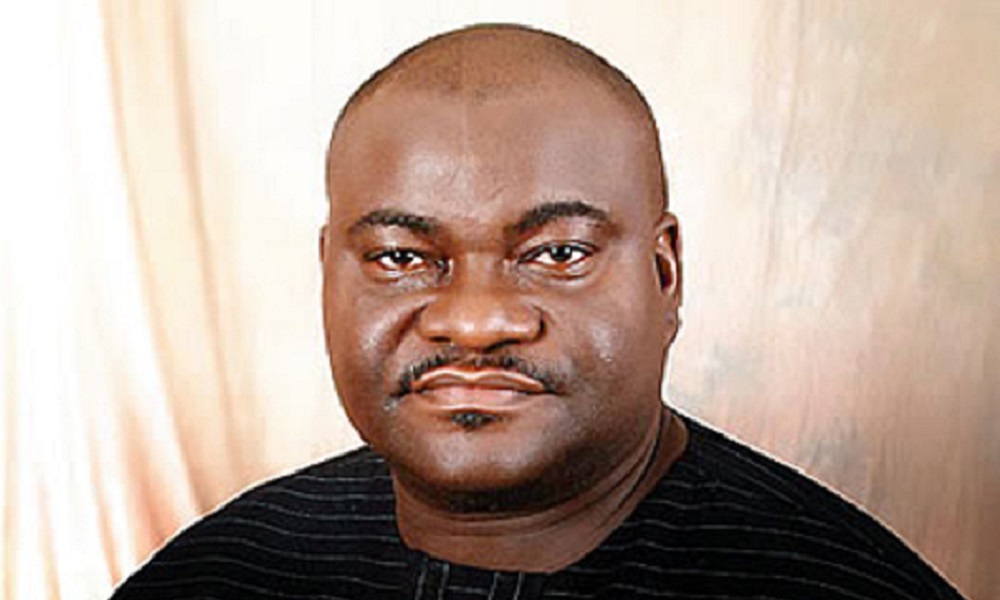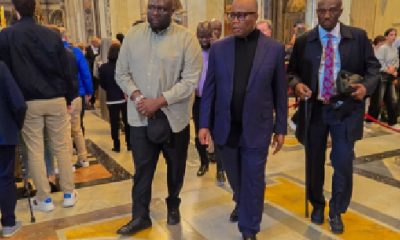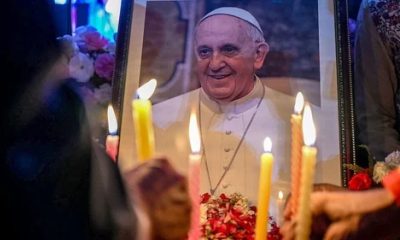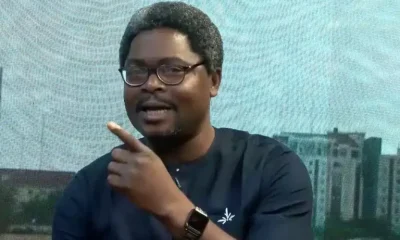Opinion
KARIMI AND THE REALITY OF OUR COLLECTIVE VULNERABILITY

By Tunde Olusunle
Commuters on the “Trunk A Road” as it was labelled, traversing Kabba-Aiyetoro Gbedde-Mopa-Isanlu-Egbe communities in Kogi State must have observed frenetic construction activities at the Egbe section of the road abutting Kwara State. I’m told vehicular movement is infrequent these days because of the decrepit condition of the road, its attendant loneliness and its susceptibility to the murderers rascality of criminals. Travellers to parts of Kwara, Oyo and Osun, from parts of the North notably Nasarawa, Benue, Kogi and the Federal Capital Territory, (FCT) these days, prefer the Kabba-Omuo Ekiti road which is marginally less degenerate. Okun-Yoruba people domiciled in their traditional abodes desiring to conduct business in contemporary Kwara State to which they once belonged, however, are left with no option but to ply the road under discussion. For them it will be easier to catch glimpses of ongoing construction in the area I previously alluded to.
There is a signpost with the inscription *Ido Egbe* in the part of the expansive Egbe community where the said development is proceeding. A luminous perimeter fence covers the generous hectarage being developed at the said site. One particular structure rises sky high above the several others all capped with lemon-green aluminium roofing. The buildings vary in shape and size even as they are at various stages of completion. A long vehicle rests around the ongoing development, obviously one of many others feeding the project with its needs. You cannot but ask yourself whether the complex is a creation of the federal or state government, or a private investor desirous of doing business in the community. Or could it be a model residential estate?
The project under reference is a *Military Foreward Operating Base, (FOB),* being developed by Sunday Karimi, the Senator representing Kogi West Senatorial Zone. Over the years, parts of the district have come under premeditated attack by armed robbers, kidnappers and unfeeling herdsmen. At various times, cold-blooded robbers have attacked banks operating in several communities in the zone. In every instance, they left behind a trail of crimson blood, sorrow and tears. From Kabba to Aiyetoro-Gbedde to Isanlu, to Odo-Ere and Egbe in Kogi West, the pattern of the hoodlums have been pretty much the same. They launch surprise attacks on the police stations in each community. They thus neutralise the capacity of the law enforcement agents to engage them when they eventually swoop on their major targets, the banks.
First Bank, Mainstreet Bank, United Bank for Africa, (UBA) and Access Bank at various times have been robbed by the hoodlums, during banking hours. The callousness of the nonessentials was so grave on every occasion that it spiralled down the subsistence economy of the locals. The banks shut down for long spells ostensibly to rethink their continuing operation or not in the district vis-a-vis the losses they incurred. They equally evaluated the costs of rebuilding decimated structures and facilities in each instance relative to whatever fiscal trickles they earned, juxtaposed with the costs of providing services to their predominantly low income customers. We are talking about farmers, small scale entrepreneurs, school teachers and local government employees mainly.
More recently, kidnapping for ransom a trend hitherto heard about from very distant ecologies, has become another dimension of criminal pastimes by faceless groups. Sleepy communities in Yagba East and Yagba West local government areas basking in their rustic innocence and quietude, have been rudely violated by harbingers of grief and lachrymose. In January this year, six people were kidnapped within a space of 48 hours, around Isanlu, headquarters of Yagba East. Three of them lost their lives trying to escape from their abductors. Two women were picked up from Ejiba in Yagba West last May, by a gang of one dozen gun-toting brigands. Okunland which previously epitomised the purest innocence, calmness, serenity and safety, has been grievously intruded upon. This is not forgetting the impudence and insult of having irreverent Fulani nomads marching their herds through our farmlands destroying the subsistence investments of the people.
As a fairly regular visitor to my home community for sundry events and programmes, I’ve often been very concerned about the inadequacy of the capacity of security operatives at the local levels. I speak here about insufficient personnel and armament wherewithal in our localities. Isanlu for instance is the headquarters of Yagba federal constituency which aggregates Yagba East, Yagba West and Mopamuro local governments. It is host to the area command of the police and oversees the three local government areas in question. I will be amazed, however, if there are up to 150 officers and men, or half that number of serviceable armaments in the armoury of the area command. I had reason to request for police cover for a family event we hosted about six years ago. The police apologetically replied and alluded to the inadequacy of manpower. I resorted to the Nigerian Security and Civil Defence Corps, (NSCDC) as backup plan. I was told straight up that the entirety of my local government area was served by 15 civil defence personnel.
Critically, I was informed that most of the men had indeed been taken up by traditional rulers in our parts. The kings as it were desire that their royalty be heralded at every stop, courtesy of state uniform-wearing operatives functioning as human furniture, who sit on the front seats of their vehicles The royalties resorted to civil defence staff in the absence of police personnel to serve in as orderlies. Such are the confounding statistics and realities of the security architecture in our sub-urban communities. Let’s be reminded that hoodlums perfect their operational strategies before they take on a target, institution or community. This of course includes distilling the prevailing personnel and armament strengths of their targets. This explains why police stations in rural communities are almost always first targets where security personnel are neutralised and the armouries accessed and looted to strengthen their own capacities.
Against the backdrop of such embarrassing and condemnable state failure at the very centre to protect and secure its citizens, this very basic constitutionally non-negotiable responsibility has had to be taken up not by subregionals, but private individuals. This is the new normal as we find in the example under interrogation. One has heard elsewhere of privileged Nigerians or organisations partnering security and intelligence services in the provision of operational needs and infrastructure. The *Military Forward Operating Base* in Egbe, however, is one hundred percent privately funded by Sunday Karimi. He has taken a broader view of the concerns of his people, with the aim of assuaging their overwhelming security worries. It is definitely a tall and ambitious project daring to conceive and build from foundation, a complex which can probably pass as a modern military barracks, but Karimi has confronted the challenge headlong.
The “Foreward Operating Base” project under review is without doubts a visionary concept. It has the “observatory,” the tall structure which dwarfs the rooftops in the upcoming premises, where soldiers on guard duties will get a good view of the area and sensitise ground troops in the event of a possible threat. There is a security post and a mini-administrative block. There are also two blocks of 12 rooms each all ensuite, which come to 24 rooms for the “rank and file,” the junior officers. Boreholes have been drilled and will pump water to overhead tanks which will service the facilities and premises, downstream. Two units of three bedroom bungalows are provided for officers, while there is also rendezvous spot, an “officer’s mess” as is tradition with the military. Hopefully, a skeletal “mammy market” for the junior officers will spawn when the facility in its wholeness is operationalised.
Expectedly, Karimi has either engaged with the military high command for the adequate manning of the facility, or has prioritised this now that the Egbe project is nearing completion. This again is part of the systemic dysfunction consuming our nation and we the citizenry. Why should government departments have to be begged and lobbied to do their jobs? This again beggars the question of either unthinkable complacency or pure lack of capacity in statecraft. On account of his present effort in helping to secure the lives and belongings of his people, Karimi deserves our collective applause. Like Leke Abejide his colleague in the House of Representatives who has championed impactful causes for his people, Karimi in this instance, has chosen to deviate from the despicable practice by some of our representatives, who have gleefully weaponised poverty. These are the mindless politicians who waylay our hapless rural folks with sachets of salt and packets of pasta on polls day.
*Tunde Olusunle, PhD, is a Fellow of the Association of Nigerian Authors, (FANA)*
Opinion
CBN under Cardoso and $6.83 Billion balance of payments surplus in 2024 that signals economic resurgence

By Ibrahim Modibbo
Since his appointment as the Governor of the Central Bank of Nigeria, in October 5, 2023, Olayemi Cardoso has continue to bring on board wide-range of macroeconomic reforms, stronger trade performance, and renewed investor confidence in Nigeria’s economy, that were aimed at putting the country back to its economic footing, as a strong economy that is second to none in Africa.
As part of the ongoing reforms, the Central Bank of Nigeria recently announced a Balance of Payments (BOP) surplus of $6.83 billion for the 2024 financial year, marking a decisive turnaround from deficits of $3.34 billion in 2023 and $3.32 billion in 2022, according to a press statement from Mrs Sidi-Ali, Hakama, the Ag. Director, Corporate Communications of the apex bank.
CBN says “the current and capital account recorded a surplus of $17.22 billion in 2024, underpinned by a goods trade surplus of $13.17 billion. Petroleum imports declined by 23.2% to $14.06 billion, while non-oil imports fell by 12.6% to $25.74 billion. On the export side, gas exports rose by 48.3% to $8.66 billion, and non-oil exports increased by 24.6% to $7.46 billion.”
While “remittance inflows remained resilient, with personal remittances rising by 8.9% to $20.93 billion. International Money Transfer Operator (IMTO) inflows surged by 43.5% to $4.73 billion, up from $3.30 billion in 2023, reflecting stronger engagement from the Nigerian diaspora. Official development assistance also rose by 6.2% to $3.37 billion,” the statement added.
Nigeria recorded a net acquisition of financial assets totalling $12.12 billion. Portfolio Investment inflows more than doubled, increasing by 106.5% to $13.35 billion, while resident foreign currency holdings grew by $5.41 billion, indicating stronger confidence in domestic economic stability. Although foreign direct investment fell by 42.3% to $1.08 billion, the overall financial account posted notable gains.
The country’s external reserves increased by $6.0 billion to $40.19 billion by year-end 2024, bolstering its external buffer.
Notably, net errors and omissions narrowed significantly by 79.5% to negative $5.10 billion in 2024, down from $24.90 billion in 2023, reflecting substantial improvements in data availability and capture. This represents a major advance in data accuracy, transparency, and overall reporting integrity.
The 2024 BOP surplus highlights the effectiveness of Nigeria’s ongoing reform agenda. The liberalisation and unification of the foreign exchange market, a disciplined monetary policy approach to managing inflation and stabilising the naira, and coordinated fiscal and monetary measures have all contributed to enhanced competitiveness and investor sentiment.
“The positive turnaround in our external finances is evidence of effective policy implementation and our unwavering commitment to macroeconomic stability,” said the Governor of the Central Bank of Nigeria. “This surplus marks an important step forward for Nigeria’s economy, benefiting investors, businesses, and everyday Nigerians alike,” the statement further noted.
Other notable indicators to building strong economy by this policy include but not limited to a stronger trade performance, particularly in the current and capital accounts, with a surplus of $17.22 billion in 2024, has contributed to the balance of payments surplus. A goods trade surplus of $13.17 billion that will further strengthens the positive trend. The decline in petroleum and non-oil imports also contributes to a more favorable trade balance.
It will noteworthy to note that the CBN’s reforms have increased investor confidence, leading to higher foreign portfolio investment inflows. Portfolio investment inflows more than doubled in 2024, reaching $13.35 billion. This influx of capital indicates a stronger belief in the stability and growth prospects of the Nigerian economy.
The apex bank’s disciplined monetary policy and FX market reforms on the other hand are aimed at managing inflation and stabilizing the Naira, has contributed to a more stable financial system.
The liberalization and unification of the foreign exchange market have led to greater transparency and reduced distortions in the market.
The implementation of an Electronic Foreign Exchange Matching System (EFEMS) further enhances transparency and efficiency in the FX market.
The reforms, including the unification of the exchange rate, have improved Nigeria’s competitiveness and attracted more foreign investment. Testament to this is the clearing of a $7 billion forex backlog which has also boosted the country’s image with foreign investors.
Also, the significant improvements in data availability and capture have led to a marked reduction in net errors and omissions in the balance of payments data. This enhanced data integrity provides a more accurate picture of the country’s economic performance and builds trust with stakeholders.
In conclusion, the combination of strong trade performance, renewed investor confidence, disciplined monetary policy, and improved data integrity, all facilitated by the CBN’s wide-ranging reforms, are key indicators of Nigeria’s economic resurgence. These developments demonstrate the positive impact of the reforms on the nation’s external finances and overall economic stability.
Dr Moddibo, a public analyst, wrote in from Abuja
Opinion
CBN leads financial dialogue with JP Morgan, NGX, others, in pre-spring meetings Forum

By Dr. Ibrahim Modibbo
In anticipation of the International Monetary Fund (IMF) and World Bank Group (WBG) Spring meetings which commenced on Monday, April 21, 2025, the Central Bank of Nigeria (CBN) partnered with J.P. Morgan, the Nigerian Exchange Group (NGX) and Africa Private Capital Association (AVCA) to host a high-profile global forum at Nasdaq MarketSite in New York on Thursday, April 17, 2025, according to press statement by Dr Ibrahim Moddibo.
The forum, titled “The Nigeria Investment Agenda: Pathways for Growth & Global Partnerships,” convened global investors, diaspora leaders, and senior financial stakeholders to examine Nigeria’s macroeconomic prospects and ongoing reform progress.During his commanding address, Governor Olayemi Cardoso outlined his comprehensive reform strategy encompassing monetary tightening, foreign exchange market transparency, and enhanced financial governance.
He emphasized that these initiatives are establishing the foundation for sustainable macroeconomic stability and heralding a new era of transparency and confidence.Governor Cardoso reaffirmed the CBN’s unwavering commitment to rebuilding credibility through orthodox monetary policy, transparency, and consistency.
“We inherited a crisis of confidence but chose a different path. We’re not turning back,” he stated decisively.In a powerful fireside chat between the Governor and Nobel Prize-winning economist Dr. James Robinson, Reverend Richard L. Pearson Professor at the University of Chicago, Governor Cardoso elaborated on his vision to reestablish the CBN as a credible, trusted institution – rooted in domestic excellence and respected internationally.Mr. Muhammad Sani Abdullahi, Deputy Governor for Economic Policy at the CBN, delivered a macroeconomic update highlighting sharp increases in foreign exchange turnover, emerging signs of disinflation, and strengthening external reserves. “With a market-determined exchange rate and a transparent, rules-based policy framework, confidence is gradually being restored in Nigeria’s economy,” he noted.
Welcoming participants to the forum, Dr. Nkiru Balonwu, Adviser to the CBN Governor on Stakeholder Engagement and Strategic Communication, framed the forum as a key moment in the Bank’s broader engagement strategy. “Today is more than a conversation,” she noted.
It’s about opening the books on the CBN’s transformation story under Governor Cardoso – sharing the facts, interrogating the progress, and looking ahead together at what more can be done to build sustainable partnerships and unlock long-term capital,” she explained.
Another key highlight of the event was the panel discussion entitled “Repricing Nigeria: Assessing the Scope for Sustained Change.” Moderated by Gavin Serkin, Founder of New Markets Media & Intelligence, the panel featured global financial luminaries: Joyce Chang, Chair of Global Research at JPMorgan Chase; Jason Rekate, Global Co-Head of Corporate Banking at Citi; Razia Khan, Chief Economist for Africa & Middle East at Standard Chartered; and Ahmad Zuaiter, Co-Founder & CIO of Jadara Capital Partners. Each panelist provided expert perspectives on Nigeria’s investment landscape, noting renewed international interest driven by improved fundamentals, strengthened governance, and clearer policy direction.
The CBN Board and Monetary Policy Committee were represented by US-based diaspora members Mr. Robert Agbede, Prof. Melvin Ayogu, and Dr. Aloysius Ordu, underscoring the Bank’s global engagement and commitment to leveraging Nigerian talent worldwide. Temi Popoola, Group CEO of NGX, moderated the Q&A session, while Dr. Olubukola Akinniyi Akinwunmi, Director of Banking Supervision at CBN, delivered the closing remarks.The forum focused on substantive discussions and future prospects: engaging critical voices, evaluating progress, and identifying requirements for building lasting partnerships and attracting long-term capital. Central to this endeavor is a clear objective: reestablishing the CBN as a credible, trusted institution respected globally and dedicated to excellence at home.
Dr. Ibrahim Modibbo, a public affairs analyst writes from Abuja.
Opinion
Instagram , WhatsApp troubled by antitrust laws

By Sonny Aragba-Akpore
While we are yet to grapple with the fate of Tik Tok which President Donald Trump had asked its parent company Byte Dance of China to divest from it’s American operations or be banned, Meta Group, owners of Instagram and WhatsApp, is troubled over antitrust concerns.
The U.S. Federal Trade Commission (FTC) has taken the group to court over anti competition issues.
Specifically, the FTC wants Meta to divest from its two biggest companies in an antitrust trial that could redefine the future of social media.
And so Meta’s world is troubled as Mark Zuckerberg’s company could be forced to sell Instagram and WhatsApp if it loses the lawsuit that has just begun in the U.S.
The FTC has accused Zuckerberg’s company of having bought both platforms to eliminate competition and maintain a monopoly on social media.
If the court rules against them, it would be a historic blow to the tech giant.
Zuckerberg acquired Instagram in 2012, and then, two years later,(2014) completed his trio by buying WhatsApp.
Facebook is the third leg of the trio and this easily makes the group the largest tech owner in the world.
Although these acquisitions were approved by the FTC itself at that time ,but now this lawsuit seeks to reverse that approval, arguing that the purchase was not for innovation but to “neutralize” emerging rivals like Instagram which was acquired in 2012 and thus take control of the entire market.
The FTC claims that Meta has used its financial muscle to block competition, buying up emerging apps instead of competing with them, and it has been doing this since 2008! Everything is based on 2012 emails where Zuckerberg had expressed concern about Instagram’s rapid growth compared to Facebook’s performance (which was his only app at the time). In those emails, Zuckerberg admitted it was better to buy than to compete. And so he did, acquiring the app years later.
“On the other hand, he also bought WhatsApp, and of course that reinforces the FTC’s accusation. Meta strengthened its control over the digital system, keeping these apps as separate platforms but under the same power structure” analysts reason.
Meta has not denied the purchases, even though it rejects having acted in an anti-competitive way, calling the case a “weak lawsuit that ignores reality,” since they believe they face strong competition from platforms like TikTok, YouTube or X among many other apps.
During the trial, Zuckerberg claimed he bought Instagram for its camera technology, not because the social network was on the rise, but the 2012 messages don’t seem to support that statement very well.
In the likelihood that FTC wins this case, Meta could be forced to sell Instagram, WhatsApp, or both. This wouldn’t necessarily mean an immediate change for users, but it would shift the balance in the digital market, according to experts.
Digital sociologists think that Meta would make it easier to regulate social networks individually by the FTC.
One of the major implications will be on things like content moderation, privacy, or the use of personal data.
“If it gets split, it would be easier for lawmakers, ensuring proper service to users” digital sociologists admit.
There are however fears of who buys if it gets to that .
For instance If a controversial figure like Elon Musk or an investment fund takes control of Instagram, like what happened with Twitter (now X), it’s possible that many users would leave in large numbers for new alternatives that may emerge, like BlueSky.
“But if it falls into the hands of a discreet company, without major visible changes, it’s likely that most people will keep using it as they always have.”
Although Meta does not reveal exactly how much it earns from each app, it is estimated that Instagram generates around $37 million a year, surpassing Facebook’s revenue according to analysts.
“So of course, Zuckerberg’s eagerness to get out of this case is clear: they can’t afford to lose that income because it would be a catastrophe for Meta” another analyst submits.
The expectations are dicey because the court’s decision will not only affect Meta, but could also open the door to more lawsuits against other big platforms for similar monopoly practices. And at a time when the control of social networks is more questioned than ever, this case could define the future of the digital system in terms of free choice and regulations.
Instagram and WhatsApp which were acquired over a decade ago have become social powerhouses and easily the biggest platforms in that genre.
This looming antitrust trial will be the first big test of President Trump’s Federal Trade Commission’s ability to challenge Big Tech.
The lawsuit was first filed against Meta — then called Facebook — in 2020, during Trump’s first term. It claims the company bought Instagram and WhatsApp to squash competition and establish an illegal monopoly in the social media market.
FTC contends that Meta has maintained a monopoly by pursuing CEO Zuckerberg’s strategy, “expressed in 2008: ‘It is better to buy than compete.’ True to that maxim, Facebook has systematically tracked potential rivals and acquired companies that it viewed as serious competitive threats.”
U.S. antitrust laws are enforced by both the FTC’s Bureau of Competition and the Antitrust Division of the Department of Justice. The agencies consult before opening any investigation. The Antitrust Division handles all criminal antitrust enforcement.
The FTC,s Bureau of Competition enforces the nation’s antitrust laws, which form the foundation of a free market economy.
The antitrust laws promote the interests of consumers; they support unfettered markets and result in lower prices and more choices.
The Federal Trade Commission Act and the Clayton Act, both passed by Congress in 1914, give the Commission authority to enforce the antitrust laws.
These laws prohibit anticompetitive mergers and business practices that seek to prevent hard-driving competition, such as monopolistic conduct, attempts to monopolize, and conspiracies in restraint of trade.
The Bureau of Competition investigates potential law violations and seeks legal remedies in federal court or before the FTC’s administrative law judges. The Bureau also serves as a resource for policy makers on competition issues, and works closely with foreign competition agencies to promote sound and consistent outcomes in the international arena.
WhatsApp (officially WhatsApp Messenger) is an American social media, instant messaging (IM), and voice-over-IP (VoIP) service owned by technology conglomerate Meta. It allows users to send text, voice messages and video messages, make voice and video calls, and share images, documents, user locations, and other content.
WhatsApp’s client application runs on mobile devices, and can be accessed from computers.
The service requires a cellular mobile telephone number to sign up.
In January 2018, WhatsApp released a standalone business app called WhatsApp Business which can communicate with the standard WhatsApp client.
The service was created by WhatsApp Inc. of Mountain View, California, which was acquired by Facebook in February 2014 for approximately US$19.3 billion.
It became the world’s most popular messaging application by 2015,and had more than two billion users worldwide by February 2020,confirmed four years later by 200 million new registrations per month.
By 2016, it had become the primary means of Internet communication in regions including the Americas, the Indian subcontinent, and large parts of Europe and Africa.
Instagram is an American photo and short-form video sharing social networking service owned by Meta Platforms. It allows users to upload media that can be edited with filters, be organized by hashtags, and be associated with a location via geographical tagging.
Posts can be shared publicly or with preapproved followers. Users can browse other users’ content by tags and locations, view trending content, like photos, and follow other users to add their content to a personal feed.
A Meta-operated image-centric social media platform, it is available on iOS, Android, Windows 10, and the web. Users can take photos and edit them using built-in filters and other tools, then share them on other social media platforms like Facebook.
It supports 32 languages including English, Hindi, Spanish, French, Korean, and Japanese.
Instagram was originally distinguished by allowing content to be framed only in a square aspect ratio of 640 pixels to match the display width of the iPhone at the time.
In 2015, this restriction was eased with an increase to 1080 pixels. It also added messaging features, the ability to include multiple images or videos in a single post, and a Stories feature—similar to its main competitor, Snapchat, which allowed users to post their content to a sequential feed, with each post accessible to others for 24 hours.
As of January 2019, Stories were used by 500 million people daily.
Instagram was launched for iOS in October 2010 by Kevin Systrom and Mike Krieger. It rapidly gained popularity, reaching one million registered users in two months, 10 million in a year, and one billion in June 2018.
In April 2012, Facebook acquired the service for approximately US$1 billion in cash and stock. The Android version of Instagram was released in April 2012, followed by a feature-limited desktop interface in November 2012, a Fire OS app in June 2014, and an app for Windows 10 in October 2016.
Although often admired for its success and influence, Instagram has also been criticized for negatively affecting teens’ mental health, its policy and interface changes, its alleged censorship, and illegal and inappropriate content uploaded by users.
-

 News20 hours ago
News20 hours agoAkpabio arrives Vatican ahead Pope’s funeral
-

 News14 hours ago
News14 hours agoList of World Leaders that are present in the final funeral of Pope Francis
-

 News10 hours ago
News10 hours agoJust in: Gunmen invade pro-Wike group in Bayelsa
-

 News18 hours ago
News18 hours agoDefections: Teejay Yusuf traces genesis of PDP palaver, key issues affecting Nigeria’s largest opposition party
-

 News19 hours ago
News19 hours agoCBEX: EFCC declares four persons wanted over crypto fraud + photos
-

 News14 hours ago
News14 hours ago2Face estranged wife, Annie Macauley breaks silence after he married Natasha
-

 News19 hours ago
News19 hours agoScandal! Osun monarch, pastor admit to COVID-19 fraud in US
-

 Politics17 hours ago
Politics17 hours agoUgochinyere remains Nigeria’s number one Hushpuppi of politics-Olayinka carpets Imo Rep




